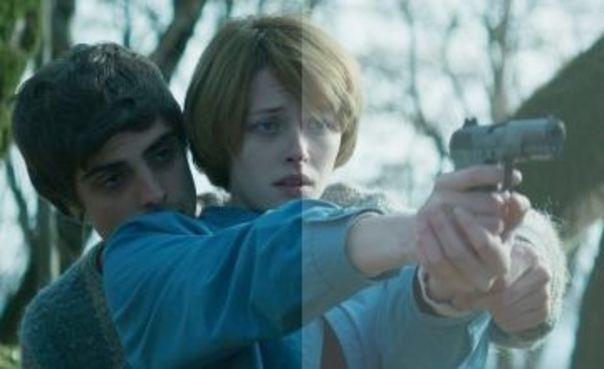Review: HOSTAGES / MDZEVLEBI
By Lana Mihailović

Tragic, at moments beautiful, sometimes absurd, HOSTAGES / MDZEVLEBI (2017) shows us the real-life events surrounding an airplane hijacking that took place on an Aeroflot flight from Tbilisi to Batumi in November 1983. The latest feature of the Georgian director Rezo Gigineishvili is a co-production between Georgia, Russia, and Poland, and it had its regional premiere at this year's Sarajevo Film Festival Competition programme.
The fact that HOSTAGES is made in co-operation with Russia is an interesting one, since the film deals with the act directly influenced by the status quo in the Soviet Union in a pre-1991 world. Still, the director's point of view is the one of a person who does not openly judge the characters, nor glorifies the hijack. His role is to acknowledge the complexity of the events – different opinions are heard throughout the film, voiced by the members of the Georgian society and high-ranked Soviet officials.
During the first third of the film, the before part, the audience gets introduced to the collective personage of several young people in Tbilisi, members of the privileged elite, mostly artists, doctors, even men of faith. Still, the knowledge that they are closed off from the West and the forbidden fruit that includes pleasures like the The Beatles, makes them miserable. This is why the marriage and the trip of Niko and Anna, two central characters, becomes a part of the plan to hijack the plane and flee to Turkey.
Motivation-wise, the starting introductions are somewhat confusing, since they are trying to give us all the necessary information, but not focusing on any of the individuals. Yet, it turns out not to be too difficult to connect with the members of this group on an emotional level, in part thanks to the powerful close-ups HOSTAGES provides. Beside the destiny of the characters, we fully experience the tragic faith of innocent crew members and passengers, which sits heavy on the viewer. Together with this is the pain and suffering of the characters' parents, who are still trying to make peace with everything ten years later, but probably never will.
What gives a poetic beauty to this film, contrary to its plot, is the cinematography that perfectly paints a feel of the eighties. The dance at the wedding celebration is a rare moment of happiness and the movement of the camera managed to capture the vibrant, chaotic, and festive nature of it, but mixed with the fear and sadness that is in the hearts of the bride and groom. Gigineishvili manages to depict an emotional and horrific event in a truthful, yet not too distant way, and leaves the audience members a chance to form their individual opinion.

